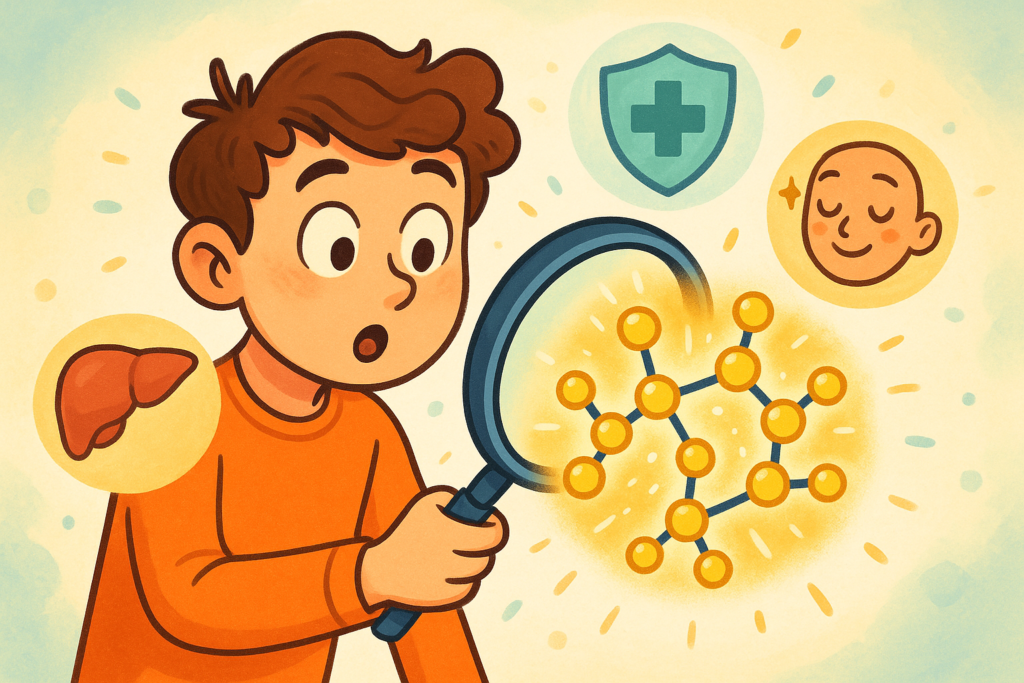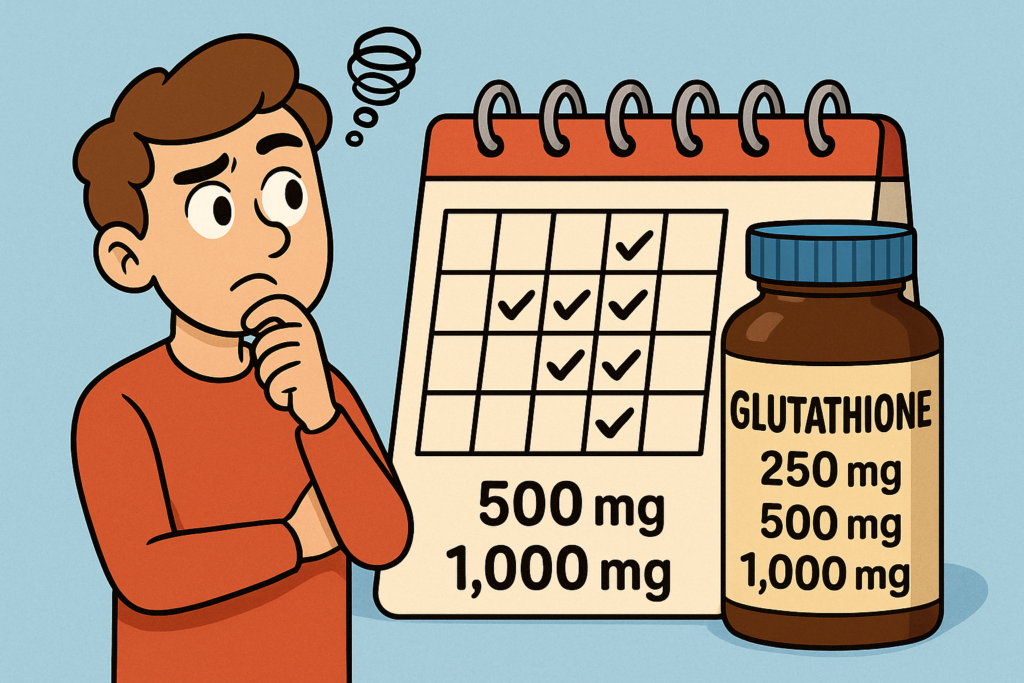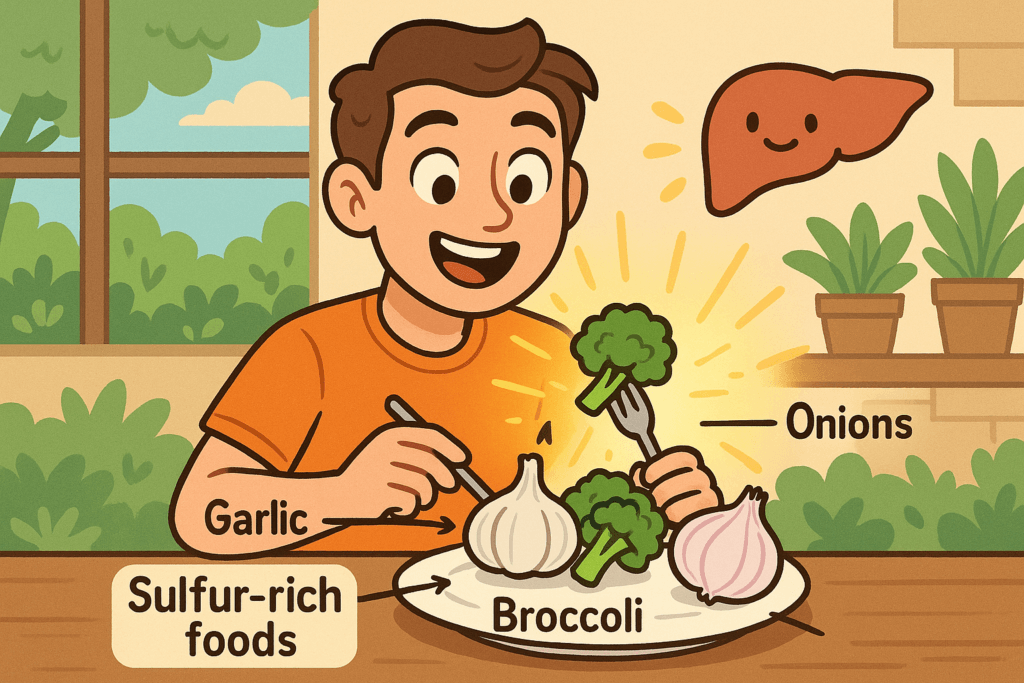Glutathione is often called the “master antioxidant” for a reason. This powerful molecule is present in every cell of your body and is responsible for performing vital functions like neutralizing free radicals, detoxifying the liver, and supporting your immune system. It helps protect your cells from damage, slows down the aging process, and even plays a role in cancer prevention. But when it comes to glutathione supplements, the question arises: How much glutathione per day should you take to experience these amazing benefits?
The right glutathione dosage can vary depending on your health goals, whether you’re looking to improve skin health, detox, or simply enhance your body’s natural antioxidant levels. In this blog post, we will discuss everything you need to know about glutathione, including its benefits, the recommended dosage, and the factors that affect how much you should take.
What Is Glutathione and Why Is It Important?
Glutathione is a naturally occurring antioxidant in the body, made up of three amino acids: glutamine, cysteine, and glycine. It plays a critical role in maintaining good health by preventing oxidative stress and reducing the damage caused by free radicals—unstable molecules that can cause inflammation, aging, and various diseases.
Importance of Glutathione:
- Detoxification: Glutathione is essential for detoxifying your body, especially the liver. It binds to harmful toxins and helps remove them from the system.
- Immune Support: Glutathione boosts the immune system by enhancing the function of white blood cells, which are critical for fighting infections and diseases.
- Antioxidant Protection: As an antioxidant, glutathione neutralizes free radicals that can damage cells and DNA. This helps in preventing chronic diseases, including heart disease, cancer, and diabetes.
- Anti-Aging: Oxidative stress accelerates the aging process, and glutathione helps counter this by reducing damage to your skin and internal organs, thus slowing down aging.

Without adequate glutathione levels, your body’s ability to fight oxidative stress diminishes, leading to poor health, decreased energy, and increased susceptibility to diseases.
How Much Glutathione Per Day Should You Take?
Glutathione is produced naturally by the body, but in some cases, supplementation is necessary to support optimal health, especially if the body’s production decreases due to age or illness. So, how much glutathione should you take per day?
General Guidelines for Dosage:
- For General Health:
If you are generally healthy and looking to maintain your glutathione levels or support overall well-being, the typical recommended dosage is between 250 mg to 500 mg per day. This dosage is safe for most adults and can provide a good antioxidant boost to keep your immune system functioning well. - For Detoxification:
If you’re using glutathione to detoxify the body, especially for liver health or to eliminate toxins, a higher dose of 500 mg to 1,000 mg per day may be necessary. This increased dosage helps to accelerate the body’s detox process, ensuring that harmful substances are eliminated efficiently. - For Specific Health Conditions:
Individuals with chronic health issues, such as autoimmune diseases, liver diseases, or those undergoing chemotherapy, may require higher doses of 1,000 mg to 2,000 mg per day. However, these higher doses should only be taken under the supervision of a healthcare provider to avoid any adverse effects. - IV Glutathione Treatment:
Intravenous (IV) glutathione treatments are generally more effective and faster-acting than oral supplements, as they go directly into the bloodstream. Typical doses for IV treatments range between 600 mg to 1,200 mg per session. This method is often used by individuals with specific health concerns or those seeking faster results.

Glutathione Dosage Based on Age and Health:
- For Children: Glutathione supplements are generally not recommended for children unless prescribed by a healthcare provider. Children’s bodies produce sufficient amounts of glutathione, but if supplementation is necessary due to health conditions, the dosage will be significantly lower and should be guided by a healthcare professional.
- For Older Adults: As we age, the body’s natural production of glutathione decreases. Therefore, older adults may benefit from a daily dose of 500 mg to 1,000 mg to help counteract the effects of aging, support the immune system, and detoxify the body.
Can You Have Too Much Glutathione?
While glutathione is a vital nutrient, it is possible to overdo it, especially with long-term supplementation. Taking more than the recommended amount, particularly for extended periods, can lead to minor side effects such as:
- Stomach discomfort (gas, bloating, nausea)
- Diarrhea
- Headaches
These side effects are usually rare and occur when dosages exceed the body’s natural absorption rate. If you experience any of these symptoms, consider reducing your dosage and consulting a healthcare provider.
High doses of glutathione, especially when taken via IV treatments, should always be administered under the supervision of a medical professional.
Factors That Affect How Much Glutathione You Need
There are several factors that influence how much glutathione your body needs. Here are some key considerations:
- Age: As mentioned earlier, older adults tend to have lower levels of glutathione. Supplementing with glutathione can help restore levels and support immune health and detoxification.
- Health Conditions: People suffering from conditions like liver disease, diabetes, or autoimmune disorders may need higher amounts of glutathione to help combat oxidative stress and inflammation associated with these conditions.
- Lifestyle Factors: Those who lead stressful lifestyles, smoke, or drink alcohol regularly may have depleted glutathione levels and may benefit from supplementation to counteract the damage caused by these habits.
- Diet: Eating foods that are rich in sulfur, such as garlic, onions, and cruciferous vegetables (like broccoli), can help boost the body’s natural production of glutathione. If your diet lacks these foods, you may need supplementation to make up for the deficit.
Discovering Lipocartilage: 5 Surprising Ways ‘Bubble Wrap Cells’ Shape Our Body’s Support System
How to Boost Glutathione Levels Naturally
In addition to taking supplements, there are various ways to increase glutathione levels naturally through diet and lifestyle changes. Here are some tips:
- Consume Sulfur-Rich Foods: Eating sulfur-rich foods like garlic, onions, broccoli, cabbage, and kale can help your body produce more glutathione naturally.
- Exercise Regularly: Regular physical activity is known to increase the production of glutathione. Exercise helps reduce oxidative stress and can enhance your body’s antioxidant defense system.
- Get Adequate Sleep: Quality sleep is essential for maintaining good glutathione levels. Aim for 7 to 8 hours of sleep each night to support optimal glutathione production.
- Limit Alcohol and Toxins: Excessive alcohol consumption and exposure to toxins can deplete glutathione levels. Limiting these factors can help preserve your body’s natural glutathione stores.

Benefits of Taking Glutathione Supplements
Taking glutathione supplements offers numerous benefits, especially if you are looking to improve your skin, boost your immune system, or detoxify your body. Here are some top benefits:
- Improved Immune Function: Glutathione supports the immune system by enhancing the function of white blood cells. It can also help your body fight infections more effectively.
- Detoxification: Glutathione is critical for detoxifying the liver, which is responsible for filtering out toxins from the body. It helps break down harmful substances, making it easier for the body to expel them.
- Skin Health: Many people use glutathione to brighten their skin and reduce the appearance of dark spots, pigmentation, and wrinkles. Its antioxidant properties help protect the skin from oxidative damage, improving its overall health.
- Anti-Aging Effects: Glutathione is essential in fighting the signs of aging. It helps reduce oxidative stress, which is one of the main causes of premature aging.
- Liver Health: Since the liver plays a significant role in detoxification, adequate glutathione levels are essential for its proper functioning. Glutathione supplementation can help maintain liver health and improve overall detoxification.
Conclusion
Glutathione is a powerful antioxidant that plays an essential role in maintaining overall health, supporting detoxification, and boosting immune function. The ideal dosage depends on individual health needs and lifestyle factors. For most people, a daily dose of 250 mg to 500 mg is sufficient to maintain health, while higher doses may be necessary for specific health conditions or detoxification purposes. Always consult with a healthcare provider before starting any supplement regimen, particularly if you have underlying health conditions.
How long does it take for glutathione to show results?
The effects of glutathione supplementation may vary, but noticeable improvements in skin health and energy levels can typically be seen within a few weeks.
Can glutathione help with detoxification?
Yes, glutathione plays a crucial role in detoxifying the body, particularly by supporting liver health and eliminating toxins.
Are there any side effects of taking glutathione?
While glutathione is generally safe, excessive intake may lead to stomach discomfort, diarrhea, or headaches. Always follow the recommended dosage and consult a doctor if needed.
Can glutathione improve my skin?
Yes, glutathione is often used to lighten dark spots, reduce pigmentation, and improve skin tone due to its powerful antioxidant properties.
How much glutathione should I take daily?
For most people, 250 mg to 500 mg per day is a safe and effective dosage for general health. Higher doses, up to 1,000 mg, may be recommended for specific health conditions.
